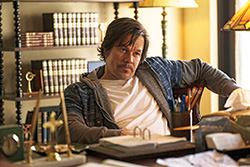Stellar acting helps Father Stu deliver a moving, true story

Stuart Long (Mark Wahlberg) argues with the seminary rector in Columbia Pictures’ Father Stu. (Photo by Karen Ballard courtesy of Sony Pictures Entertainment)
By Ann Margaret Lewis
It’s rare these days to see a piece of entertainment out of mainstream Hollywood that depicts a priest in a sympathetic light. It’s even rarer to have a film on a religious subject matter that is fairly well made.
On both of these rarities, Sony Picture’s Father Stu delivers.
While the film is rated R primarily for language, it realistically reflects the gritty, formative life experience of Father Stuart Long, a priest of the Diocese of Helena, Mont., and the subject of this moving biopic. Long struggled to be ordained and serve as a priest after being diagnosed with a degenerative illness called inclusion body myositis.
While first-time director Rosalind Ross did a fine job behind the camera, her writing in the screenplay is not without flaws. Nevertheless, she did tell a story that is deeply moving. I was scrambling to find tissues at the end.
What really struck me, however, were the acting performances, which were stellar. Mark Wahlberg reached deep for his performance, even gaining 30 pounds during the film’s production to reflect Father Stu’s degenerative physical changes at the end of his life. His growth in holiness as his body failed was well done. Catholic actor Wahlberg has evolved a great deal as an actor, and he shines in this role.
Mel Gibson and Jackie Weaver portray Father Stu’s estranged parents, who struggle with Stu’s terrible initial life choices and later, the one to which God had called him. Their story arcs are interesting, though Gibson’s seems to have more of satisfying culmination than Weaver’s. Both actors were joys to watch.
Stu’s spiritual journey to the priesthood kicks into action following a devastating motorcycle accident, after which he experiences what can be interpreted to be a vision of the Blessed Mother. The ambiguity of the scene adds realism to what Stu experienced and sets up well his later calling.
Again, most of the film’s flaws can be found in the screenplay. I cannot entirely fault Ross on this, however. Father Stu’s story is a complicated one, and like most biopics some bits of information must be glossed over for the sake of time.
Nevertheless, one brief piece of information that would have added some icing to Wahlberg’s lovely performance was the fact that Father Stu was actually intelligent and had earned a college degree in English literature. While Wahlberg does show some small hints of base cleverness in his performance, he largely comes across as lacking education.
This is particularly clear when he submits his seminary application in the form of a crudely scrawled letter to the seminary rector, portrayed by veteran British actor Malcolm McDowell. Had Stu’s former education been noted somehow, they could have played that off his rather clumsy decisions prior to entering the seminary. It would also explain how he managed to pass his classes later.
Meanwhile, Catholics who know the details of how seminaries work will also scratch their head when all it takes Stu to be accepted by the seminary is a pointed argument with the rector. Most priests will tell you it takes a bit more than that, not to mention that a seminarian has to first become affiliated with a diocese, something that is not broached at all in the film.
The only final writing flaw to the film is a bit of incongruity on the part of Stu’s girlfriend Carmen, genuinely played by Teresa Ruiz. When we first meet her, she is adamant that premarital sex is not on the table for her as a faithful Catholic. She later changes her mind on this, and while we do not need characters to be squeaky clean or without incongruity or faults, there is no character progression to show how she ultimately came to that decision.
Regardless, I was pleasantly surprised and moved by this film, and I think most viewers will be, too. It’s well-worth a watch.
(Ann Margaret Lewis is executive assistant in the archdiocesan Office of Communications and the author of several books. E-mail her at alewis@archindy.org.) †
